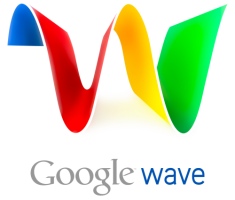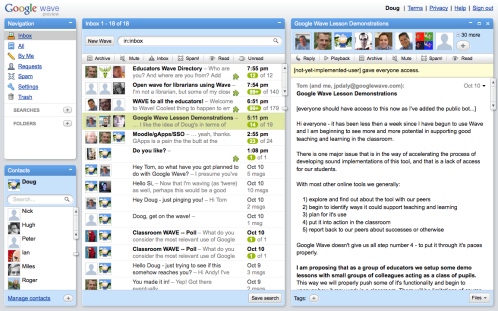3 ways Google Wave could be used in the classroom.

So you’re an educator who’s managed to score an invitation to Google Wave. You’ve had a play and it’s all very nice, but how could it be used in education?
Before I go any further, read these:
- Lifehacker – Google Wave 101
- Google Wave Lesson Demonstrations (a wave started by Tom Barrett)

Here are 3 ways I think Google Wave could be used by students for actual learning rather than just playing with something because it’s cool.
1. Empowering learners
There was a great presentation at the TeachMeet that accompanied the Scottish Learning Festival this year. Fearghal Kelly talked about his experiments with giving one of his classes more ownership over their learning. He ran them through the learning objectives and the content they would need to cover and then the student co-created and collaborated on planning what exactly they wanted to do.
Google Wave would be great for this as it allows wiki-like editing but is more threaded and conversation-like. The whole wave can also be ‘replayed’ to see how the thinking of the group evolved over time. It’s something I’d definitely be trying if I had a GCSE or AS/A2-level class… :-p
2. Student feedback
The most powerful learning experiences are those where students have ownership of their learning. That’s been dealt with above. But that’s of no use if students don’t know how to get better in a particular subject or discipline!
That’s why I think Google Wave could be used as an Assessment for Learning tool. Learning as a conversation could be shown in practice through having an individual wave for each student/teacher relationship. Alternatively, these could be small group and ability based to enable peer learning.
I can imagine waves being used for ongoing learning conversations once Google Wave becomes a feature of Google Apps for Education. I’ll certainly be experimenting with it for that purpose! 😀
3. Flattening the walls of the classroom
One of the really exciting things about Google Wave is the ‘bots’ you can add to automate processes. One of these bots allows for the automatic translation of text entered in one language into that of the recipient.
Whilst language teachers may be up in arms about the idea of ‘not needing’ to learn another’s language, I think it could be fantastic for removing barriers for worldwide collaboration. Imagine the power of students having the digital and wave-equivalent of ‘penpals’ in various classrooms around the world.
Now that really would ‘flatten the walls‘ of the classroom. 🙂
What excites YOU about Google Wave’s potential for education?
Related articles by Zemanta
- Google Wave: Few Thoughts (cloudave.com)
- Google to let Apps users try out Wave (macworld.com)
- Two-Minute Video Makes a Lot of Sense of Google Wave [Google Wave] (lifehacker.com)
- video: Ribbit Conference Gadget for Google Wave (skypejournal.com)

![Reblog this post [with Zemanta]](http://img.zemanta.com/reblog_e.png?x-id=9ba8c039-9afb-4668-88c7-9740d6c93dc2)

![Reblog this post [with Zemanta]](http://img.zemanta.com/reblog_e.png?x-id=75a147c5-bf6f-41cd-af44-99ba7b37a634)